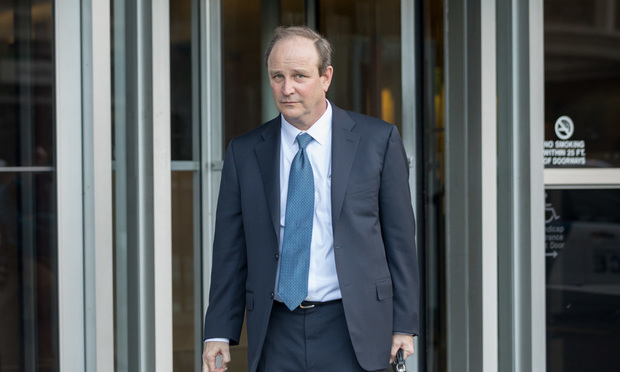Samsung's Anti-Suit Injunction Against Huawei on Shaky Ground at Federal Circuit
Appellate judges question U.S. District Judge William Orrick's decision to put Chinese injunction on hold while he analyzes smartphone licensing dispute.
December 03, 2018 at 06:58 PM
4 minute read
 Charles Verhoeven, Quinn Emanuel Urquhart & Sullivan.
Charles Verhoeven, Quinn Emanuel Urquhart & Sullivan.
The U.S. Court of Appeals sounded poised Monday to defer to a Chinese injunction that Samsung Electronics Co., Ltd. says will force it to “cry uncle” in its high-stakes patent licensing dispute with Huawei Technologies Co. Ltd.
“Samsung can't afford to have its plants shut down in China,” Quinn Emanuel Urquhart & Sullivan partner Charles Verhoeven told the court in the Monday hearing. Such a shutdown would force Samsung to accept unfair terms for Huawei patents that are essential to practicing 3G and 4G connectivity standards.
Verhoeven pleaded with the court to leave in place an anti-suit injunction entered by Judge William Orrick III. That order would leave the Chinese injunction in place, but block Huawei from enforcing it until Orrick determines whether each side has met its contractual commitment to license on fair, reasonable and non-discriminatory terms, or FRAND.
“If they enforce the injunction then we'll have to agree to their terms,” Verhoeven said. “That's called patent holdup.”
But the Federal Circuit sounded skeptical during the 40-minute hearing. Judge Kathleen O'Malley suggested that Samsung bore much of the blame for resisting negotiations with Huawei for seven years.
“What is it that gives the district court the right to decide the question before the Chinese courts do?” O'Malley asked. “When the same questions are presented to both, why doesn't the Chinese court have the authority?”
Sidley Austin partner Constantine Trela Jr. faced less hostile questioning. “The Chinese court issued the injunctions there because it found that Huawei had complied with FRAND and Samsung had not,” he told the court. “That decision is entitled to respect from the U.S. courts.”
Huawei Technologies v. Samung Electronics appears to be one of the first opportunities for the Federal Circuit to weigh in on anti-suit injunctions, which have become increasingly popular as technology companies litigate FRAND disputes.
Huawei brought its suits against Samsung in San Francisco and China on essentially the same day in 2016, alleging that Samsung has not honored its commitment to standard-setting bodies such as the European Telecommunications Standards Institute. Samsung argues in its briefs that it has made significant concessions, at first demanding payment from Huawei, later offering a royalty free global-cross license, and finally offering to pay Huawei a net royalty fee. Huawei, meanwhile, has clung to its demand for 1.5 percent of each unit sold throughout the negotiations, Samsung alleges.
The Chinese litigation moved quickly. Following the injunction, Huawei's IP chief Jianxin Ding said a public forum that Huawei didn't want to kick Samsung out of China, but would use the threat as “a bargaining chip.”
In the Federal Circuit suit, Orrick ruled that “the bulk” of precedent supported Samsung's argument that injunctions are inconsistent with the FRAND commitment. “The appropriate remedy for Huawei's breach of contract claim may very well be the injunctive relief issued by the Shenzhen court,” he wrote earlier this year. “But I must have the opportunity to adjudicate that claim without Samsung facing the threat of the Shenzhen court injunctions.”
On Monday, it didn't sound as if that logic would sway O'Malley. She demanded that Verhoeven tell her where Orrick explicitly found a public policy against injunctions in SEP cases.
“I can go back and—” Verhoeven started.
“Go back and look, because I looked it up three times,” O' Malley told him, “and the [NInth Circuit] Court of Appeals did not rely on that public policy either.”
Chief Judge Sharon Prost and Judge Todd Hughes also wondered how much there is for Orrick to decide, because neither is willing to let him to set a FRAND rate for its portfolio.
“At a certain point this all just ends up to being delaying,” Hughes said. “The district court, it's going to take another year and half to decide those breach of contract claims. One or both of you are going to appeal from that, and all the time, you're going to be selling your phones, you're going to be manufacturing their phones, and they're not going to be getting their patent licenses paid.”
The Shenzhen courts may not have the last word even in China. Samsung is appealing its decisions to the Guangdong High People's Court. The Federal Circuit asked for a formal status report on the Chinese appeals before Monday's hearings and then had more questions during arguments. A ruling from the Chinese appellate court could come within the next couple of months, Trela said.
This content has been archived. It is available through our partners, LexisNexis® and Bloomberg Law.
To view this content, please continue to their sites.
Not a Lexis Subscriber?
Subscribe Now
Not a Bloomberg Law Subscriber?
Subscribe Now
NOT FOR REPRINT
© 2025 ALM Global, LLC, All Rights Reserved. Request academic re-use from www.copyright.com. All other uses, submit a request to [email protected]. For more information visit Asset & Logo Licensing.
You Might Like
View All
K&L Gates Files String of Suits Against Electronics Manufacturer's Competitors, Brightness Misrepresentations
3 minute read
Meta Workers Aren't of One Mind on Company's Retreat From DEI, Fact-Checking

California Court Denies Apple's Motion to Strike Allegations in Gender Bias Class Action

White & Case KOs Claims Against Voltage LLC in Solar Companies' Trade Dispute
Trending Stories
- 1We the People?
- 2New York-Based Skadden Team Joins White & Case Group in Mexico City for Citigroup Demerger
- 3No Two Wildfires Alike: Lawyers Take Different Legal Strategies in California
- 4Poop-Themed Dog Toy OK as Parody, but Still Tarnished Jack Daniel’s Brand, Court Says
- 5Meet the New President of NY's Association of Trial Court Jurists
Who Got The Work
J. Brugh Lower of Gibbons has entered an appearance for industrial equipment supplier Devco Corporation in a pending trademark infringement lawsuit. The suit, accusing the defendant of selling knock-off Graco products, was filed Dec. 18 in New Jersey District Court by Rivkin Radler on behalf of Graco Inc. and Graco Minnesota. The case, assigned to U.S. District Judge Zahid N. Quraishi, is 3:24-cv-11294, Graco Inc. et al v. Devco Corporation.
Who Got The Work
Rebecca Maller-Stein and Kent A. Yalowitz of Arnold & Porter Kaye Scholer have entered their appearances for Hanaco Venture Capital and its executives, Lior Prosor and David Frankel, in a pending securities lawsuit. The action, filed on Dec. 24 in New York Southern District Court by Zell, Aron & Co. on behalf of Goldeneye Advisors, accuses the defendants of negligently and fraudulently managing the plaintiff's $1 million investment. The case, assigned to U.S. District Judge Vernon S. Broderick, is 1:24-cv-09918, Goldeneye Advisors, LLC v. Hanaco Venture Capital, Ltd. et al.
Who Got The Work
Attorneys from A&O Shearman has stepped in as defense counsel for Toronto-Dominion Bank and other defendants in a pending securities class action. The suit, filed Dec. 11 in New York Southern District Court by Bleichmar Fonti & Auld, accuses the defendants of concealing the bank's 'pervasive' deficiencies in regards to its compliance with the Bank Secrecy Act and the quality of its anti-money laundering controls. The case, assigned to U.S. District Judge Arun Subramanian, is 1:24-cv-09445, Gonzalez v. The Toronto-Dominion Bank et al.
Who Got The Work
Crown Castle International, a Pennsylvania company providing shared communications infrastructure, has turned to Luke D. Wolf of Gordon Rees Scully Mansukhani to fend off a pending breach-of-contract lawsuit. The court action, filed Nov. 25 in Michigan Eastern District Court by Hooper Hathaway PC on behalf of The Town Residences LLC, accuses Crown Castle of failing to transfer approximately $30,000 in utility payments from T-Mobile in breach of a roof-top lease and assignment agreement. The case, assigned to U.S. District Judge Susan K. Declercq, is 2:24-cv-13131, The Town Residences LLC v. T-Mobile US, Inc. et al.
Who Got The Work
Wilfred P. Coronato and Daniel M. Schwartz of McCarter & English have stepped in as defense counsel to Electrolux Home Products Inc. in a pending product liability lawsuit. The court action, filed Nov. 26 in New York Eastern District Court by Poulos Lopiccolo PC and Nagel Rice LLP on behalf of David Stern, alleges that the defendant's refrigerators’ drawers and shelving repeatedly break and fall apart within months after purchase. The case, assigned to U.S. District Judge Joan M. Azrack, is 2:24-cv-08204, Stern v. Electrolux Home Products, Inc.
Featured Firms
Law Offices of Gary Martin Hays & Associates, P.C.
(470) 294-1674
Law Offices of Mark E. Salomone
(857) 444-6468
Smith & Hassler
(713) 739-1250






